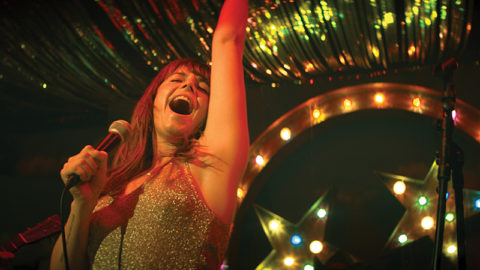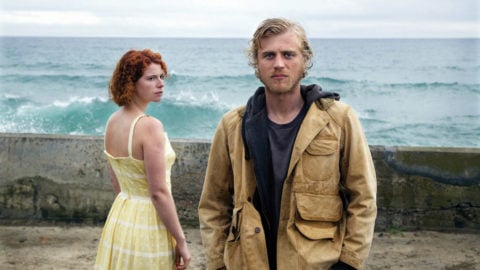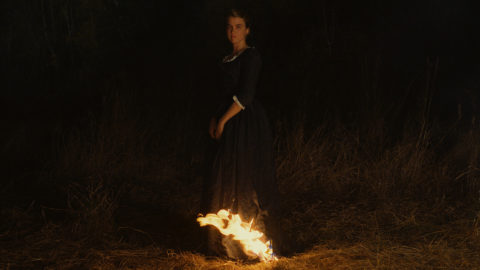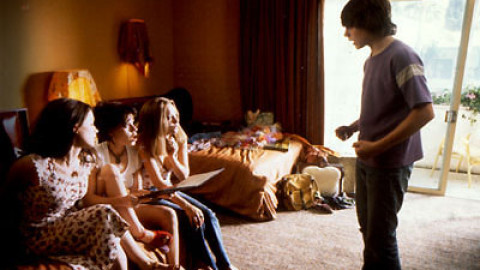Interview: Jessie Buckley
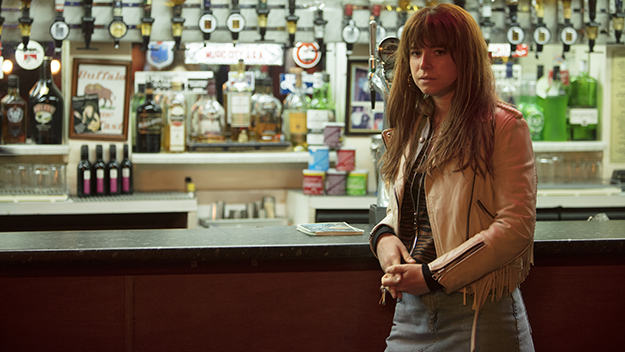
Images from Wild Rose (Tom Harper, 2018)
Trying to describe Jessie Buckley to people unaware of her talents is a fool’s errand. Fool that I am, I did my best in a print review of her new starring vehicle Wild Rose, calling her “neither an actress who can carry a tune nor a singer with a functional screen presence, but a protean performer of limitless potential,” and referring to her breakout turn in the 2017 psychodrama Beast as “one of the few recent portrayals deserving of the term ‘fearless.’” The simple truth is that accurate accounts of her musical and dramatic range are bound to seem hyperbolic to anyone who hasn’t witnessed her in action, and comparisons to other artists fail to capture the 29-year-old Irish star’s sui generis energy. During a conversation before her acoustic performance at a New York screening of Wild Rose—in which she plays a young Glaswegian single mother and ex-con with dreams of becoming a country musician—Buckley reflected on the film’s themes of unguarded emotion (not for nothing did the words “feral” and “elemental” keep cropping up in our talk), the vital need for self-expression, and, like those of a country song, the winding roads that always lead back home.
The aspect of Wild Rose that I find most moving, even though it doesn’t emerge as a theme until the end, is this idea that you have to go away in order to come back. That you never really know how you feel about home until you’ve experienced a contrast. I imagine that’s relatable to anyone who has a complicated relationship with their hometown. Is that something that resonates with you, especially now that you spend so much time traveling?
Yeah. I mean, I miss home. But I definitely understand that feeling of wanting to test outside the landscape where you grew up. You know, as a little kid, I was curious—I wanted something more, but I also was afraid of that, I suppose. And I definitely feel that I’m on a journey of going as far away from my root and my home as is possible, and yet in my heart, I know who I am and where I’ve come from, and I go home to reconnect with something that’s en-rooted—that’s like, my story. Who I am. How I look at the world is colored by how I looked at the world when I was a little girl, and also the journey that has happened from that point onward and different things I’ve seen.
Tell me about where you grew up. It was Killarney, wasn’t it?
Yeah, I grew up in Killarney. It’s a Lake District town in Ireland, and my dad used to run a guest house. And our family had a pub and a hotel in the center, which had been in the town for years. My mom was a harpist and a singer. She grew up in a county more to the north, and moved down to Kerry. She used to play the harp in a hotel, and my dad came up to her and said, “Hello, would you like to hear a poem?” And recited a poem to her. [Laughs] So we grew up with music and expression, fecklessness and free—it was quite feral in lots of ways. That sounds wishy-washy and, I dunno, a bit Irish [laughs].
It was a very organic place to grow up. We lived at the foot of a mountain, and you could just go out and there were things growing just because they wanted to grow. Nothing was planted, things just happen. I think even within our family that was something—if you wanted to do music or learn piano, [my parents] were more into encouraging us to experience something like that, nurturing something like that, than having materialistic things. They didn’t care about that at all. And there were a lot of us—I’m the eldest of five, and we’re all different ages: my youngest sister has just left primary school. And once you’re able to work, you went out for work. That’s what you had to do. Which is good, you know? We were never spoon-fed out of a gold spoon or anything—there were really amazing moral values that they taught us about what’s important in life, which I’m so incredibly grateful for. But I was quite an anxious child.
What’s your first memory of music? Was that always part of your life?
I think, my mom, when I was very, very young, came over to London to train to be an opera singer—to be a classical singer. We were living in London, and I remember, like, being in my nappy in the back of her class with all these singers. But probably my earliest conscious experience with it was, my mom used to sing for these American tour groups called People to People groups, which were like young students who’d come over to Ireland and France, and they’d have a tour or whatever. And so they’d come into this tiny little town hall in Kerry, and I remember it was like the first time of being really emotionally punctured by watching my mom, because it was a really selfless thing. It felt selfless; she was giving them something. In this tiny hole, she was moving them by telling these stories, and singing to them with all her heart, as if she were singing in Carnegie Hall! And yet we were in this tiny town hall, with American students who were probably more into ’80s pop or something like that [laughs]. But she captured them! And I remember just thinking, it was magical, the power of that.
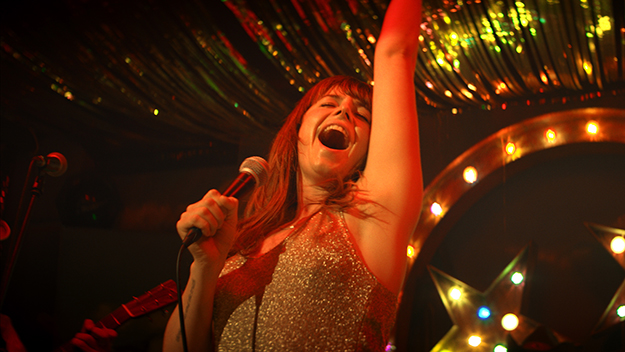
I’m curious how your discovery of performing, and your early pursuits of music, relate to Rose-Lynn’s [the heroine of Wild Rose]. You had more encouragement, obviously.
Yeah. Yeah, I played music from a really young age: piano, clarinet, harp.
And with the same passion for it that she has?
Oh yeah! I mean, I remember doing the town musical—like Jesus Christ Superstar—and one night my appendix nearly burst onstage because I was so belligerent in wanting to finish the show! And then I came home, and was like, “I’ve a pain in my tummy” [laughs]. I had a piano teacher called Ulla, and she was the first person who told me, in piano, to think about an image, and paint a piano piece like it’s a picture rather than something that’s just mechanical. Creating an image [with music].
My piano teacher used to say that getting the notes right was the least important part.
Yeah!
So you performed in school, an all-girls school—and you performed some male roles, I understand.
[Laughs] Damn, you’ve done your research! Yeah, I was always the man!
In West Side Story, you were Tony?
I was Tony in West Side Story.
I wish there was footage of that.
I really am so pleased that there isn’t. All I can tell you is that I wore an excellent big red suit, and the only way to define the girls from the boys was that the girls wore French plaits, and they put two red dots in the middle of their eyes. And then I played—it was Children of Eden, and I think I played Jesus or Adam, something like that. And then I played Freddie Trumper in Chess.
Was that fun?
Oh my God, I loved it! I mean, for me, I found second-year school very stressful. I found learning like that to be incredibly stressful, that pedantic formula of getting information—I just couldn’t process it at all. I wanted to learn, and I love learning, but I just couldn’t do it like that. So when we did the shows, I could just escape.
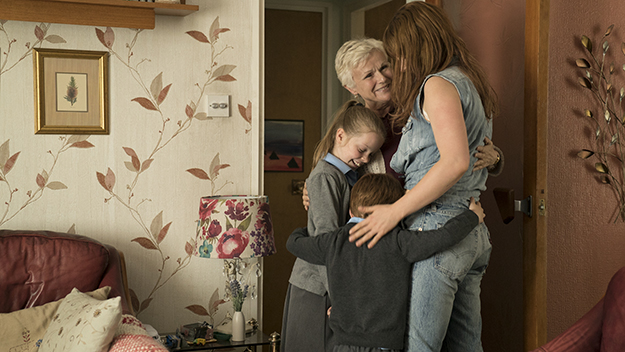
And so you’ve followed a winding path, away from music into drama, and then back into music.
I mean, I’ve never planned—I definitely never thought I would make a film. That just was something that belonged to somebody way off where. But when I moved to London, somebody kindly offered for me to go do a four-week Shakespeare course at RADA. I’d done a bit at school, but that was just school [laughs]. I remember doing it, and I was like, “Oh my God.” I couldn’t believe how powerful the words could be, and how full each word was as well. You could always realize something new about yourself [from the text].
I’d moved over to London initially to go to drama school, but I’d gotten involved in a show and then I got a job, and then I ended up doing jazz singing. Then I said to my agent, “I want to go back and study,” and she was like, “Do it.” I also wanted to hang out with people my own age, and get drunk in a pub on Friday, and do normal things people my age did. Drop myself in [with] as many writers as I could, and understand more. And when I was there, I had a funny kind of time with my singing. It’s a fantastic school, but it’s also an institution; they’re very particular about what they think you will do and will be. They’ve got a formula. So when I was there, they were like, “You’re going to be a classical actress.” There was no space for my singing, really.
Did you rebel?
Yeah, I did. [Laughs]
But you’ve done your share of classical acting. You’ve done Shakespeare with Judi Dench.
Yeah!
Does having a musical background help with Shakespearean dialogue? Having a sense of rhythm, a knowledge of phrasing?
Oh, I don’t know. I don’t really think of it like that. Whenever I work on Shakespeare, it’s more like, you have to find the poetry in it. There is a musicality in it, and if you don’t listen to that, you’re losing something. I suppose when I work on it, it’s about finding the humanity in each character. And the great Shakespearean actors like Judi Dench and Mark Rylance, they have the ability to make each thought seem so fresh.
Spontaneous-seeming.
And true to the musicality of it. And you’re always trying to even touch a little corner of what they do, because it’s pretty spectacular. I’ve got a lot of work to do before I get to that [level].
Like Wild Rose, Beast is a film about a person with strong ties to a very particular place [Jersey, one of the Channel Islands located between England and France], but she finds it quite constricting. How much of your character Moll’s discontent owes to the remoteness of her environment, and how much is intrinsic to her?
I think it’s both. The thing that I learned from Moll in Beast is that as people, we have the capability to have such darkness—every single one of us. I remember watching it and [thinking], “This is like a rebellion against society,” you know? We’re told what’s good and what’s evil, and how to behave in society and not cause a scene. But in each one of us, we all—depending on what circumstance we grew up in, what environment we had or what’s happened in our lives, we all have the capability to be characters like Moll, or characters like Pascal…
And the landscape! Jersey’s a quite incredible island, because it’s very elemental. You’re surrounded by this massive electrical sea, and it’s very wild, and it’s also isolated. It’s a character in itself; it doesn’t belong to either Britain or France. Some people speak French and some people speak English. And in the middle of it there’s this conservative tax haven, where there’s somebody employed by the government to measure the height of hedges per week. So Moll is afraid of that beast in her, which she’s trying to push down as much as she can; she’s also living in a place that’s like a pressure pot. She’s pushing it down in a place where there’s massive fire underneath her, in the land that she’s living on and how she feels inside.
If there’s a common thread between Moll and Rose-Lynn, it’s raw emotion. “Elemental” is a good word for their temperaments. Does that come readily to you?
What do you think? [Laughs]
It’s not like flipping a switch.
No. No.
Do you have techniques you use, or memories you draw from?
You know, with characters like that, it takes months for me to get into that mindset. They don’t come just like that [snaps fingers], nor do I want them to, because there’s so much to experience and explore beforehand. The best thing about these women, or any women [I play], is I’ve been able to look at the world differently because of them. And each one is very different, because they’re all different people. So if I just flipped a switch, it would be generic and boring.
Is it cathartic to release so much emotion?
Yeah, I find it cathartic. It can also be—sometimes it takes a while for a character to leave you. You come out of fake life into real life when you’ve been in that mindset, and sometimes it takes a minute to adjust. But yeah, I find it really liberating. If I hadn’t played characters like Moll or Rose, I don’t know if I’d be who I am today, because they’ve encouraged me to be braver.
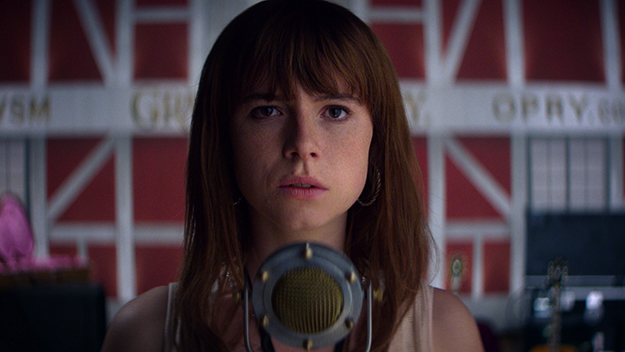
There’s a line I love in the song at the end of Wild Rose, which has to do with the therapeutic power of music: “We both know there’s nothing a little time and Patsy Cline wouldn’t fix.”
[Laughs] That line used to be “There’s nothing a little wine and Patsy Cline wouldn’t fix.” We had to change it because apparently it’s not [in posh English accent] appropriate for the children.
Is that a fact?
That is—you’ve got that firsthand!
But I think there’s truth in that line, either way. Are there songs that you find particularly healing?
There are songs that I love singing. I find most singing really quite healing and freeing. I’ve no objective apart from enjoying it. I don’t want a music career. I just want to—like with my mom, I want to experience something that means something to somebody. There are songs that I love, songs with stories behind them. Like, I love “Boulder to Birmingham.” Before Gram Parsons died, [he told] two of his best friends: “When I die, steal my body from the morgue, take it to the canyon, and set it alight.” And it’s a song that Emmylou [Harris] has written about her standing atop the canyon watching his body burn. And songs like “Angel from Montgomery,” which is about a woman who’s not had the chance to realize the life that she wants.
It’s only slightly facetious to say that I’ve heard you speak in every accent on screen but your own [laughter]. You’ve done a lot of accent work, haven’t you? In a short span of time.
Yeah.
How do you approach that?
With fear! [Laughs] If I don’t get this right, they’re gonna chase me out of whatever town I’m meant to be from with pitchforks.
Would you go to those places and see if you could pass?
Yeah. Not all the places. And I work with dialect coaches as soon as I can, really. And I love that… With Wild Rose, I worked for a few months before I started, and then I did place myself in Glasgow a month before. We were making recordings of the album, and I just went into Glasgow a few weeks before we started filming. I was really scared about this accent because, they’re very proud, the Glaswegians, and rightly so. And it was so intrinsic to who she was. I don’t know—I might’ve done a really bad job. But people have told me I’ve done a good job for months. Who knows? All you can do is go in and do your best, and hope you resemble the character as well as you can. And accents—it’s the flavor of a person, it’s the rhythm, the attitude. It’s lots of things. But I try to get as far into it as I possibly can, and draw on lots of different things that influence where this person’s voice is coming from.
Were you into country music before Wild Rose?
No.
Not at all? How about now?
[Laughs] Yeah, now I love it!
Why is Rose-Lynn offended by the term “country western?” Does it have to do with how the music is packaged?
You know, honestly, I don’t know. I’m sure [screenwriter] Nicole Taylor told me this about three years ago, but—I think it’s just the turn of phrase, it’s…
Facile?
Well, “country and western” is very, like, posh, you know? But I honestly don’t know—you’ll have to ask Nicole Taylor about that. I’m sure there is some specific reason, but I’m not gonna try and muster some bullshit up [laughs]. I’m giving you three chords and the truth!
Steven Mears received his MA in film from Columbia University, where he wrote a thesis on depictions of old age in American cinema.



